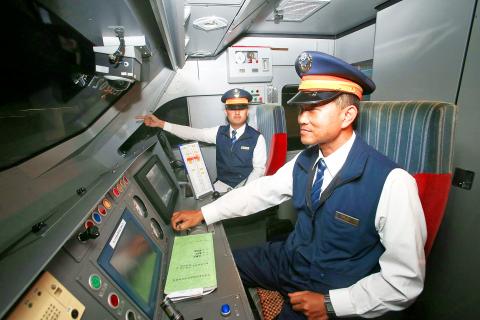The Taiwan Railways Administration (TRA) yesterday said that 228 apprentices and 10 driving assistants have been dispatched to assist drivers of express train services to promote passenger safety.
The initiative is part of reforms at the TRA that Minister of Transportation and Communications Wu Hong-mo (吳宏謀) announced on Monday after a Puyuma Express train derailment on Oct. 21 that killed 18 passengers and injured 215.
Preliminary findings by an Executive Yuan investigative team showed that the train driver, surnamed You (尤), was communicating with a train dispatcher and an inspector about a technical problem he was having for 43 minutes.

Photo courtesy of the Taiwan Railways Administration
The accident shows the risk of having only one driver on board, prompting the Ministry of Transportation and Communications’ (MOTC) decision to have two drivers operating each train.
MOTC Deputy Minister Chi Wen-chung (祁文中) yesterday morning visited the TRA to see how it was implementing the new measure.
The TRA has 18 Puyuma Express and eight Taroko Express train services.
To implement the two-driver policy, the apprentice drivers and driving assistants yesterday started assisting the drivers of the two express train services, the TRA said.
“We will see if we need to continue implementing the two-driver policy after we have ascertained that the ATPs [automatic train protection] can function reliably,” Chi said.
The TRA has six types of trains: diesel-electric locomotives, electric locomotives, diesel hydraulic locomotives, push-pull electric locomotives, steam locomotives and electric multiple units.
It takes about 23 months to train a driver to operate one type of train, and another month of training to be able to operate a different type of train, the TRA said.
The TRA Train Drivers’ Association said that it used to be a TRA policy to have two drivers on board.
“However, as the agency began acquiring new trains and safety equipment, it began experimenting with having only one driver operate the train,” the association said.
The group said it has been urging the TRA to return to a two-driver policy for all trains after the collision at Dali Train Station (大里) in Yilan County in 2007, but the agency has rejected its proposal.
Meanwhile, the Society of Railway and National Planning said that the task force entrusted to conduct a comprehensive evaluation of the TRA should take an in-depth look at the issues facing the agency.
“We absolutely understand the importance and necessity of having such a task force, but the task force should give the TRA a vision as well as strategies to achieve them before talking about reforms. It should also review how transport policies in the past have affected the TRA’s operations,” the society said.
Members of the task force should feel free to talk about what they think the problem is without fear of being punished, and all stakeholders must strive to reach a consensus on measures that the task force proposes to improve the agency, the society said.
Finally, the task force must list specific steps and timeline that the TRA must follow, which should help the agency reorganize its personnel structure, recruit workers and make budget plans, it said.

The CIA has a message for Chinese government officials worried about their place in Chinese President Xi Jinping’s (習近平) government: Come work with us. The agency released two Mandarin-language videos on social media on Thursday inviting disgruntled officials to contact the CIA. The recruitment videos posted on YouTube and X racked up more than 5 million views combined in their first day. The outreach comes as CIA Director John Ratcliffe has vowed to boost the agency’s use of intelligence from human sources and its focus on China, which has recently targeted US officials with its own espionage operations. The videos are “aimed at

STEADFAST FRIEND: The bills encourage increased Taiwan-US engagement and address China’s distortion of UN Resolution 2758 to isolate Taiwan internationally The Presidential Office yesterday thanked the US House of Representatives for unanimously passing two Taiwan-related bills highlighting its solid support for Taiwan’s democracy and global participation, and for deepening bilateral relations. One of the bills, the Taiwan Assurance Implementation Act, requires the US Department of State to periodically review its guidelines for engagement with Taiwan, and report to the US Congress on the guidelines and plans to lift self-imposed limitations on US-Taiwan engagement. The other bill is the Taiwan International Solidarity Act, which clarifies that UN Resolution 2758 does not address the issue of the representation of Taiwan or its people in

US Indo-Pacific Commander Admiral Samuel Paparo on Friday expressed concern over the rate at which China is diversifying its military exercises, the Financial Times (FT) reported on Saturday. “The rates of change on the depth and breadth of their exercises is the one non-linear effect that I’ve seen in the last year that wakes me up at night or keeps me up at night,” Paparo was quoted by FT as saying while attending the annual Sedona Forum at the McCain Institute in Arizona. Paparo also expressed concern over the speed with which China was expanding its military. While the US

SHIFT: Taiwan’s better-than-expected first-quarter GDP and signs of weakness in the US have driven global capital back to emerging markets, the central bank head said The central bank yesterday blamed market speculation for the steep rise in the local currency, and urged exporters and financial institutions to stay calm and stop panic sell-offs to avoid hurting their own profitability. The nation’s top monetary policymaker said that it would step in, if necessary, to maintain order and stability in the foreign exchange market. The remarks came as the NT dollar yesterday closed up NT$0.919 to NT$30.145 against the US dollar in Taipei trading, after rising as high as NT$29.59 in intraday trading. The local currency has surged 5.85 percent against the greenback over the past two sessions, central